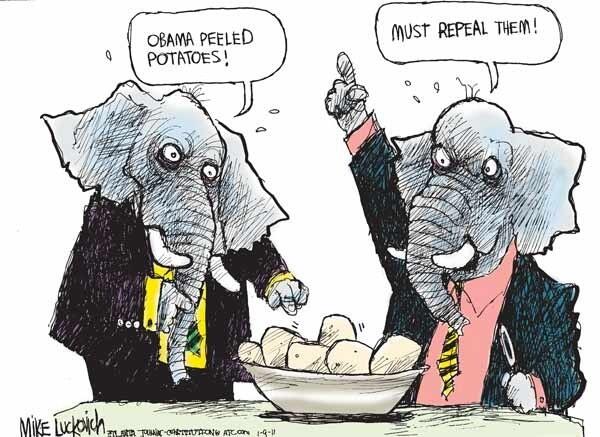On January 20th 2015, when delivering his second to last State of the Union (SOTU) address, President Obama assertively used the podium to unveil his progressive agenda, and emphatically prove that he has indeed got his swagger back. The 2015 SOTU was particularly unique; Obama abandoned his fleeting hopes of constructively working with his opponents in the GOP, who seem determined to undo the reforms he has made. The President focused on highlighting his ideological stances, because it’s evident that cooperation is but a dream. Instead of waving the white flag, he reminded his audience that his signature is the only thing that stands between a bill and a law. Truly, one ought to be surprised by such a bold statement, coming from the president with the fewest number of bills vetoed since James Garfield.[1] Controversial policies have already been added by the GOP controlled Congress to the legislative agenda, such as the No Taxpayer Funding for Abortion and Abortion Insurance Full Disclosure Act of 2015. Thus, the relationship between Obama and the Legislature is sure to be quite combative as the ultimate goal of each appears to be defending their respective ideologies rather than acting as catalysts for comprehensive policy reform. You know… that weird thing that politicians are actually supposed to do…
In SOTUs past, Obama was not #blessed enough to receive a wave of good economic updates shortly before delivering his annual address. Despite the recent losses experienced by the Democrats in the 2014 midterms, the President proved that he had a lot to be proud of. With gas prices plummeting, the lowest unemployment rate since the 2008 financial crisis, and a bustling economy, he reminded his audience that there is good news to announce every now and again. Using his recent economic successes as supportive fallback, he demonstrated that middle-class economics succeeded in wielding growth. “I have no more campaigns to run” he announced. While his Republican adversaries colleagues thought it to be a marvelous occasion to brazenly celebrate, “I know, cause I won them” he continued.[2] Well played, Mr. President. The shift in the legislative balance of power will not be as univocal as many have envisioned it; instead it will be met by a counterbalance from President Obama.
Directly following the SOTU, the GOP proved that the threat of a veto would not stop partisan bills from flooding the floors of Congress. Two days after Obama’s speech, the Republican-held House prepared to vote on a anti-abortion bill on the anniversary of the Roe v. Wade. Because what’s better than infringing on a woman’s right to choose, as a marketing ploy for an annual anti-abortion rally? The Affordable Care Act (ACA) repeal was like clockwork; we all knew it would be at the top of the legislative agenda. HR 7, or the “No Taxpayer Funding for Abortion and Abortion Insurance Full Disclosure Act of 2015,” however, was not on anyone’s radar.
Although the balance of power in government has shifted, the GOP appeared more fragmented than ever, incapable of solidifying a unified stance on a topic like abortion. This was made apparent when a group of Republican women lead by Representative Rene Ellmers (R-NC) stopped the first draft of the bill entitled, “Pain Capable Unborn Child Protection Act” from coming to a vote.[3] The original policy proposal would have banned abortions after 20 weeks of pregnancy. This blatant violation of constitutional rights bill came after 12 Republican representatives voted against John Boehner for Speaker of the House. Many of the female legislators proved they would not be elicited by the zealotry of their far-right colleagues. The Obama Administration has already publicly denounced the bill, threatening a veto before it has even passed the Senate. The new bill would do exactly what the title suggests; it would outlaw any taxpayer funding for abortion. Additionally it would only provide exceptions for victims of rape or incest if the incident had been reported to the local police. When asked, Speaker of the House John Boehner replied “Yes, there have been a couple of stumbles.”[4] Whether or not that is an understatement will soon tell, as moderate Republicans move further away from the tea party on hot-button issues. This divide is also evident in the debate over the ACA after 3 House Republicans stopped the party’s efforts to yet again repeal the President’s health care plan. This was the first time any Republican had voted against repealing Obamacare the ACA.[5] As if introducing an unconstitutional bill so early in the game wasn’t enough. This internal division may play a role in defining how the GOP will use their advantageous position to formulate policy, and how they will work or not work with a Democratic president.
The President’s SOTU speech, followed by HR 7 set the stage for contentious policy making to be the norm this legislative session. It is unlikely that this division will result in one party dominating the policy-making process. Rather this will presumably produce continuous deadlock, as we’ve seen over the last few years. This dynamic could bring about many results. Whether it is another shutdown or a few fist fights, will be determined by not only the two bodies themselves but by the issues and events that are sure to unfold in the coming months. Following the SOTU, President Obama’s former opponent Mitt Romney posted on Facebook, “He ignores the fact that the country has elected a Congress that favors smaller government and lower taxes.”[6] Whether or not it is the President who, by refusing to step aside, is solely creating this contention is unlikely. Despite the recent elections which paved the way for 74 Congressional freshman, the legislative body retains a 15% approval rating. Meanwhile, following the SOTU, the President’s approval rating increased to a staggering 50%, the highest it has been since the first few months of second term.[7] With the President’s newfound popularity, and a hefty dose of swagger, Congressional democrats may start to consider admitting that they know him.
References:
[1] United States Senate. Summary Of Bills Vetoed, 1789-Present. Washington, DC: United States Government, 2015. Print.
[2]Obama, Barack. 2015. Remarks By The President In State Of The Union Address. Washington, DC: Office of the Press Secretary.
[3]O’Keefe, Ed. 2015. ‘House Republicans Pass Watered-Down Antiabortion Bill’. Washington Post. http://www.washingtonpost.com/politics/abortion-bill-dropped-amid-concerns-of-female-gop-lawmakers/2015/01/22/56ffafea-a24a-11e4-903f-9f2faf7cd9fe_story.html.
[4] Milbank, Dana. 2015. ‘Yes, There Have Been A Couple Of Stumbles’. Washington Post. http://www.washingtonpost.com/opinions/dana-milbank-republicans-discover-that-it-isnt-easy-running-congress/2015/01/27/cdacca1e-a66a-11e4-a06b-9df2002b86a0_story.html.
[5] Mershon, Erin. 2015. ‘3 Republicans Say No As House Again Votes Obamacare Repeal’. Politico. http://www.politico.com/story/2015/02/3-republicans-say-no-as-house-again-votes-obamacare-repeal-114882.html.
[6] Hohmann, James. 2015. ‘GOP: Obama Ignored Message Of Midterm Thumping’. Politico. http://www.politico.com/story/2015/01/gop-barack-obama-ignored-message-114426.html.
[7] Clement, Scott, and Dan Balz. 2015. ‘Poll: Rising Economy Boosts Obama’S Standing On Eve Of The State Of The Union’. Washington Post. http://www.washingtonpost.com/politics/poll-rising-economy-boosts-obamas-standing-on-eve-of-the-state-of-the-union/2015/01/18/e66a2f18-9f28-11e4-9f89-561284a573f8_story.html.



